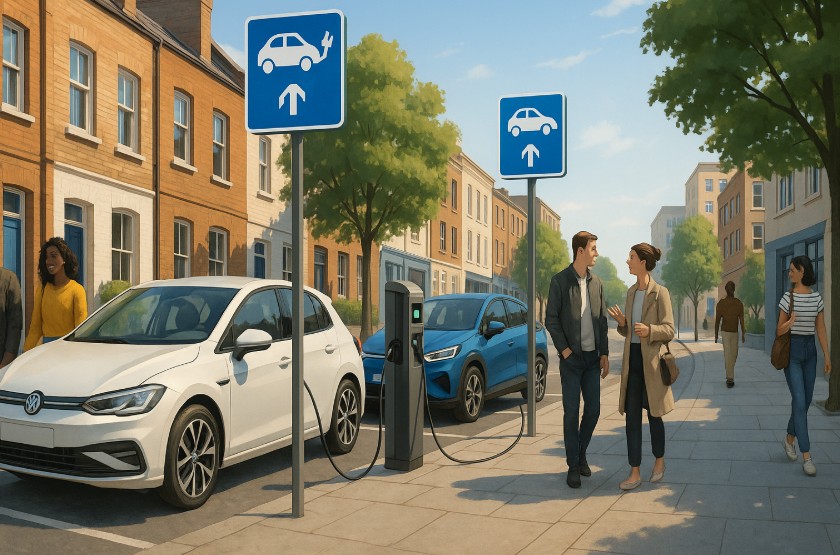Table of Contents
The UK is on a fast-track journey to a zero-emission future, with significant milestones set to reshape how you drive. One of the boldest moves involves phasing out new petrol and diesel cars and vans, a decision aimed at meeting net-zero goals by 2050.
With deadlines already written into law, the transition to electric vehicles (EVs) is no longer optional but essential.
Understanding these timelines, policies and their impacts helps you stay ahead. This guide covers what’s changing, when, and what it means for you.
What Is the UK’s Current Electric Vehicle Mandate?

The UK’s electric vehicle mandate is a legal requirement for car manufacturers to gradually increase their production and sale of zero-emission vehicles (ZEVs).
This mandate outlines yearly targets that rise incrementally, with a goal of 100% ZEV sales by 2035. These rules are designed to phase out internal combustion engine vehicles in favour of electric options.
Manufacturers must meet minimum quotas of EV sales each year:
- 2024: 22% of car sales must be ZEVs
- 2030: 80% of car sales must be ZEVs
- 2035: 100% of car and van sales must be ZEVs
Companies can bank or trade credits if they over- or under-perform. These flexible options allow them to meet targets without immediate penalties. This approach ensures a smoother industry-wide transition to electrification.
Is the 2030 Petrol and Diesel Car Ban Still in Effect?
Yes, the 2030 ban on the sale of new petrol and diesel cars is still in effect, although it has seen some political reconsideration. The rule marks a pivotal moment in the UK’s environmental strategy, halting the sale of traditional fossil-fuelled vehicles by that year.
This deadline only applies to new vehicles, meaning you’ll still be allowed to drive or sell used petrol or diesel cars after 2030.
The 2030 target has been enshrined in government policy as part of the broader climate change plan. However, recent political developments have introduced uncertainty about whether it might be delayed or adjusted.
Still, manufacturers are already ramping up EV production to meet this deadline, making it unlikely to be reversed.
Why Was the Ban Pushed to 2035, and What Changed Politically?
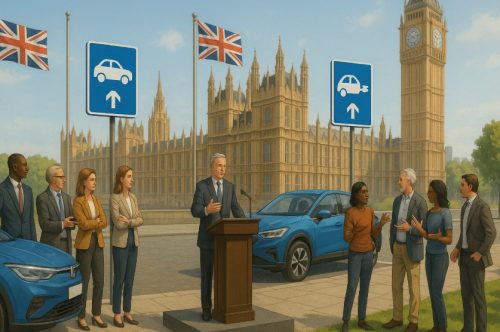
Before 2023, the UK was set to ban both petrol and diesel vehicles by 2030, including hybrids. However, political shifts and economic concerns led to changes in the timeline. The government officially extended the deadline for the sale of hybrid vehicles to 2035.
How Did the Government’s Stance Shift After 2023?
The delay came in response to lobbying by car manufacturers and public pushback. It gave the industry more time to scale infrastructure and make EVs more affordable for drivers. Policymakers argued this delay would still support environmental targets while easing the transition.
What Role Does the Labour Party Play in EV Policy?
The Labour Party has signalled its intention to reinstate the 2030 deadline, particularly for the sale of internal combustion engine (ICE) vehicles. They view the delay as a step backwards in the UK’s commitment to climate change mitigation.
- Labour emphasises a faster transition to clean transport
- They aim to reintroduce stronger industry accountability
- Their policy includes restoring the 2030 ban in full
This stance is gaining traction, especially among eco-conscious voters and climate-focused organisations. If elected, Labour could significantly alter the current timeline once again.
How Will the Phase-Out of Hybrid Cars Be Handled?
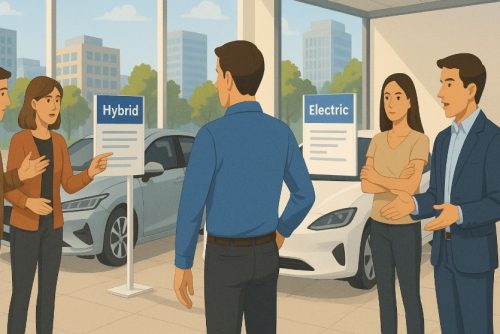
Hybrid vehicles, which combine a petrol engine with electric power, have been granted a longer phase-out timeline compared to fully petrol or diesel cars. Under current rules, new hybrid vehicles can be sold until 2035, giving manufacturers and consumers more flexibility.
This extension applies to vehicles that can drive a significant distance with zero emissions, often referred to as plug-in hybrids (PHEVs). After 2035, only full electric and hydrogen-powered cars will meet the requirements of the ZEV mandate.
This policy shift reflects the government’s long-term goal of eliminating all tailpipe emissions from vehicles on UK roads. Existing hybrid cars will not be banned, and you can continue to use, buy, or sell used hybrid models even after 2035.
What Does the UK’s Zero Emission Strategy Mean for Drivers Like You?
The UK’s Zero Emission Strategy directly affects your vehicle choices, running costs, and future mobility options. While your current petrol or diesel car remains legal to drive, you’ll notice a shift in market offerings, taxation, and infrastructure.
As more manufacturers focus on electric production, the availability of petrol and diesel models will decline. Public and workplace charging infrastructure is expanding rapidly, with a goal of 300,000 chargepoints by 2030. New laws will also increase transparency around energy tariffs and charging station reliability.
You’ll also see changes in car taxes, insurance rates, and low-emission zone policies that favour EV owners. The transition will be gradual, but you’re encouraged to start planning now if you’re considering a new vehicle purchase.
Which Car Manufacturers Are Leading the EV Shift in the UK?
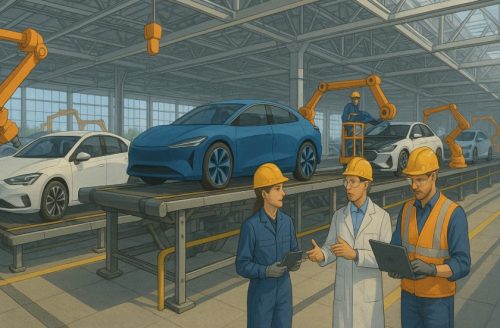
Car makers are aligning their strategies with the UK’s EV mandates, and many are already transitioning faster than legally required. These manufacturers are investing in battery technology, redesigning their models, and building EV-dedicated factories.
- Jaguar Land Rover plans to become fully electric by 2025 for Jaguar and 2030 for Land Rover.
- Ford has committed to offering all-electric passenger vehicles in Europe by 2030.
- BMW/Mini will launch a fully electric Mini lineup manufactured in Oxford by 2030.
- Stellantis (Vauxhall, Peugeot) plans to end ICE car sales in the UK by 2028.
- Tesla continues to dominate the EV space with strong sales and wide charging infrastructure.
Global Brands Adapting to UK Rules:
- Volkswagen is accelerating its electric ID. series in the UK.
- Hyundai and Kia offer some of the most affordable long-range EVs.
- Mercedes-Benz is expanding its EQ lineup in response to UK demand.
This global shift shows strong alignment with UK policy, offering you more choice and better technology.
What Financial Incentives Are Available for Electric Vehicle Buyers in the UK?
While some EV grants have ended, there are still several financial benefits for drivers making the switch. These include tax savings, workplace incentives, and EV leasing schemes designed to reduce upfront costs.
| Incentive Type | Description |
| Benefit-in-Kind Tax (BiK) | Very low for EVs, making company car schemes more attractive |
| Salary Sacrifice Schemes | Allows employees to lease EVs tax-efficiently through their employer |
| EV Homecharge Scheme | Grants for landlords and flat owners to install chargepoints |
| Zero Road Tax for EVs | Fully electric vehicles pay no road tax until 2025 |
| Workplace Charging Scheme | Offers £350 per socket for eligible workplace installations |
Even without direct purchase grants, these incentives significantly reduce lifetime ownership costs. Check eligibility before applying, as schemes vary across regions.
How Can You Prepare for the Upcoming EV Transition?
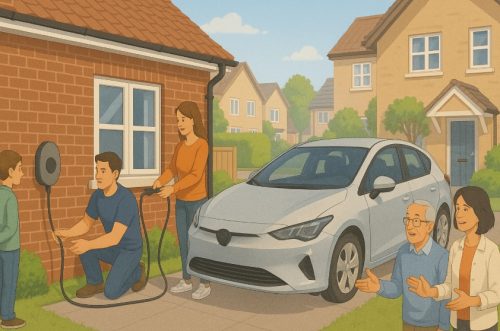
Preparing for the EV future doesn’t have to be overwhelming. You can take simple steps now to ease the transition and ensure you’re ready when the mandates take effect.
Practical Tips to Prepare:
- Research EV models and compare range, features, and charging needs
- Explore used EV options for affordability
- Look into leasing or salary sacrifice schemes
- Check your home’s suitability for a chargepoint installation
- Plan routes with public chargers if you commute or travel often
Financial Preparation:
- Assess running costs, including energy tariffs and insurance
- Calculate total cost of ownership over five years
- Factor in government incentives where applicable
By preparing early, you can make a smart, informed decision that benefits both your wallet and the environment.
What Are the Long-Term Benefits of Mandating Electric Vehicles in the UK?
Mandating electric vehicles offers long-lasting advantages that go beyond reducing carbon emissions. The UK’s initiative supports cleaner air, better public health, and a modern, efficient transportation network.
EVs produce no tailpipe emissions, directly lowering air pollution in cities and towns. The shift also encourages investment in renewable energy and smart grid solutions. Over time, electric vehicles can be cheaper to run and maintain, creating financial benefits for households.
Other Benefits Include:
- Strengthening domestic EV manufacturing
- Supporting green jobs and industries
- Aligning with the UK’s 2050 net-zero goal
The ripple effects of this transition will be felt across sectors, helping to build a more sustainable and resilient future for the country.
Conclusion
The UK’s plan to make electric cars mandatory is already in motion, driven by strong legislation and industry momentum.
While dates and policies may shift with politics, the overarching trend is clear: electric vehicles are the future. You won’t be forced to give up your current car, but all new choices will soon be electric.
Preparing now ensures you’re ready for what lies ahead. Whether it’s understanding policies or exploring incentives, your EV journey starts with being informed.
Frequently Asked Questions
What is the difference between an electric vehicle and a hybrid vehicle?
An electric vehicle (EV) runs solely on battery power, while a hybrid combines a petrol engine with an electric motor. Hybrids still produce emissions, unlike EVs.
How long does it take to charge an electric car at home?
Using a home wallbox, it typically takes 6 to 12 hours for a full charge, depending on battery size and charger speed. A standard 3-pin plug will take longer.
Will petrol and diesel cars still be allowed on UK roads after the ban?
Yes, you can still drive, buy, and sell used petrol and diesel cars after the 2030 and 2035 bans. The law only applies to new vehicle sales.
Are there penalties for not switching to an electric vehicle in time?
There are no direct fines for keeping your current car, but you may face higher taxes and restrictions in low-emission zones. Compliance becomes stricter post-2030.
How will rural areas be supported during the EV infrastructure rollout?
The UK government plans targeted charger installations in rural and remote areas. This ensures equitable access to charging points across the country.
Can second-hand electric cars help meet the UK’s emission targets?
Yes, used EVs make clean transport more accessible and affordable, supporting overall adoption rates. Their increasing availability boosts the second-hand EV market.
What happens to existing petrol cars after 2035 in terms of resale value?
Resale values may decline gradually as demand shifts toward EVs. However, well-maintained petrol cars will still have market value in the near future.




